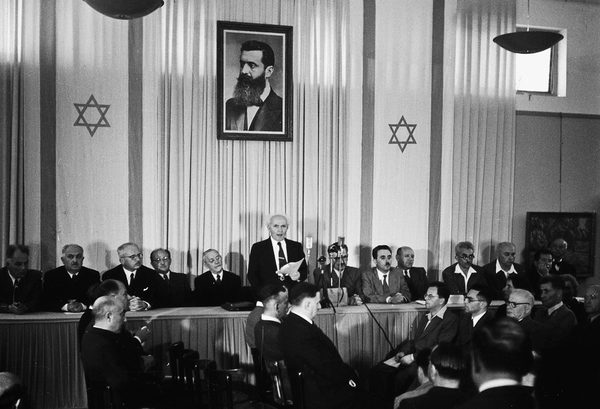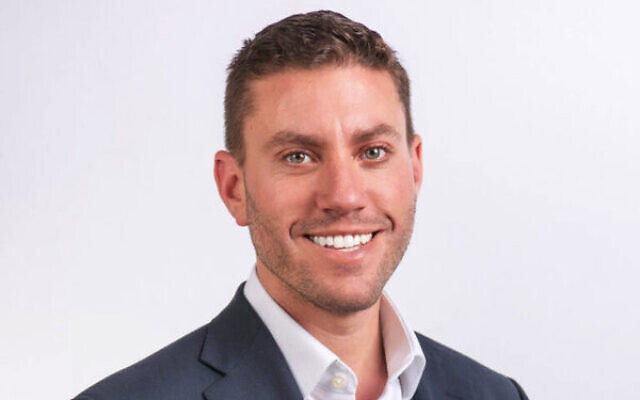We cannot allow others to define Zionism
Far from being a tale of conquest, the Zionist mission embodies an anti-colonial ethos, a reclaiming of homeland by an ancient indigenous people.
Zionism is not just a political movement; it is a symbol of pride, a beacon of hope and a source of inspiration. It stands as testament to the power of self-determination, the miraculous journey of an ancient people who, after two millennia of yearning for their homeland, triumphed against all odds to re-establish their sovereignty. It’s a narrative unparalleled in history – a story of resilience, hard work and the indomitable spirit of our people. It is the original decolonisation success story.
The establishment of the State of Israel in 1948 was far from a foregone conclusion. It was the antithesis of colonialism, achieved after overcoming immense challenges imposed by the British, by Arab resistance, by restrictions on migration, sovereignty, armament and trade. The 1948 war, when the newborn Jewish state emerged victorious against the joint forces of the Arab empire, is a shining example of the power of human ingenuity and the will to survive. The oft-misrepresented story of Arab displacement as part of the ongoing conflict overlooks the essence of Zionism: a struggle for the right to self-govern as Jews and a desire to revive a culture, a language and a people’s right to live freely in their ancestral land, alongside – not to the exclusion of – other inhabitants of the land.
Far from being a tale of conquest, the Zionist mission embodies an anti-colonial ethos, a reclaiming of homeland by an ancient indigenous people. The principles that underpinned the founding of Israel – democracy, minority rights and a commitment to contributing positively to the global community – are principles that can guide other movements for self-determination. From the Yazidis to the Kurds and Tibetans, from indigenous Canadians and Australians to Palestinians, the Zionist blueprint offers a model for establishing and creating a thriving sovereign nation through an investment in shared institutions, education and an unwavering commitment to democracy.
Our history of persecution, struggle and self-determination informs our empathy and solidarity with oppressed peoples worldwide. Jews have been at the forefront of every social justice movement here and abroad. We were heavily involved in the civil rights movement in the US, with Jewish lawyers acting in landmark court cases bringing an end to segregation. Jews marched with Martin Luther King and were pivotal in the Freedom Rides that characterised civil rights advocacy in the 1960s. In Australia, Jewish lawyers assisted in the early days of the Aboriginal Legal Service, headed two parliamentary and judicial enquiries into Indigenous matters and were involved in several land rights cases from the early 1990s, including most famously, the Mabo High Court decision. This activism is a continuation of the ancient Jewish values and tradition of pursuing justice and safeguarding the rights of all individuals, reflecting the democratic values that have been the cornerstone of Israeli society since its inception.

Since its establishment, Israel has gone to great lengths to pursue peace and advance progressive ideals, successfully absorbing disproportionately large numbers of refugees, allowing same-sex couples to adopt children, boasting an army with members from 73 countries, permitting abortion and ranking as the only democracy in the Middle East. Far from being a “colonial outpost”, these policies walk the fine line of a religious, democratic nation in the 21st century and should serve as an example to other countries.
For a few hours on October 7, our people experienced an absence of state and army. We saw helpless Jews massacred and kidnapped, taking us back to our darkest days. Between May 15 and July 8, 1944, in just eight weeks, 437,000 Hungarian Jews were deported to Auschwitz. Almost all of them were murdered. The outcome of an eight-week long Hamas rampage without the State of Israel and the brave soldiers of the IDF defending our people is unimaginable. Never again is answered by Zionism and the very existence of our beloved state.
Israel is far from perfect. But it does have a history and a future to be proud of. For these reasons, we cannot allow others to define Zionism for us. I am proud to align myself with the Zionism of the dreamers and visionaries. While others may try to make us think twice before calling ourselves Zionists, I recall the words of Menachem Begin: “I am not a Jew with trembling knees. I am a proud Jew with 3700 years of civilised history.” My commitment to Zionism is unwavering, not as an endorsement of every Israeli government’s action, but as a pledge to the ideals of Jewish self-determination, justice and peace.
Since the Zionist Federation of Australia was founded by Sir John Monash in 1927, it has been working to cultivate a thriving Zionist community in Australia. With this role, comes the responsibility to ensure we define Zionism for what we know it to be – a true gift to the world. Our community stands together under a broad tent – religious and secular, conservative and progressive – but fundamentally, living, breathing custodians of the Zionist spirit, refusing to give up our dream of a free, safe and secure Israel living in peace among the nations.
Alon Cassuto is CEO of the Zionist Federation of Australia.


comments